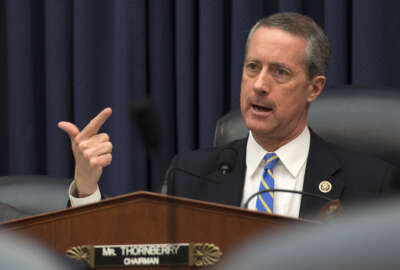
Top defense lawmaker says DoD is using money it doesn’t have in 2017
House Armed Services Chairman Mac Thornberry says the Defense Department is already spending $6 billion it hasn't budgeted for in 2017.
The House Armed Services Committee’s top lawmaker said the Defense Department clearly needs another emergency wartime fund to pay for its expenses in 2017.
The possibility of another fund to pay for wartime costs began picking up steam earlier this month when President Obama announced he would keep almost 3,000 more troops in Afghanistan than previously planned.
“I hear that the Pentagon has estimated there are roughly $6 billion worth of activities that are underway now that were not in the President’s budget [for 2017],” House Armed Services Committee Chairman Mac Thornberry (R-Texas) told reporters during a July 25 roundtable.
If Congress creates a wartime fund, it will be the second one created to pay for the wars in Iraq and Afghanistan. The first account, dubbed the overseas contingency operations (OCO) fund, has come under scrutiny as a way of raising defense spending without triggering sequestration.
But, since President Obama decided to lift the troop caps, Congress has been calling on DoD to figure out the funding.
“This budget does not have room for the troops [the President] is committing. For all of the bluster about funding troops in harm’s way, it is the President who proposes to extend the vital mission without any resources behind it. The White House must submit a supplemental funding request to accommodate troop levels in Afghanistan immediately,” Thornberry said in a July 6 statement.
Defense Secretary Ash Carter already said DoD is looking into the option of asking Congress for another wartime account.
“We’re looking at that right now. Chairman Thornberry recognized that point. We recognize that point as well. And so we’ll be making that determination as we go through the process of estimating costs and what we already have in our supplemental — or OCO budget. And we’ll make adjustments if we need to,” Carter said during a media availability on his way to Warsaw, Poland.
Chat with Jonathan Alboum, USDA CIO, July 26 at 2 p.m. Sign up here.
Thornberry acknowledged DoD is working on a supplemental request, but said he did not know where things stand in regard to the White House and Office of Management and Budget.
He added that he “strongly” hopes the White House does not demand increases in domestic spending as a concession for adding to the defense budget.
“That is holding our military hostage. These [troops] I just met with don’t have any choice about whether to be in Iraq and Afghanistan and do what the President orders them to do and it is absolutely indefensible if they are not fully supported in what they are ordered to do,” Thornberry said. “To hold them hostage … for some sort of a domestic agenda is wrong in every way.”
Advocates for more domestic spending question the amount of money the government is spending on defense when domestic infrastructure and education are not up to public standards. The President’s budget asks for $600 billion for DoD in 2017. Domestic budget requests for all of the other agencies combined is slightly less than the defense budget.
Last year there was a showdown between the White House and Congress over the use of OCO to pad the defense budget without triggering sequestration or increasing the domestic budget.
President Obama vetoed the 2016 Defense Authorization Act. It wasn’t until Congress agreed to a budget deal that raised both the domestic and defense budgets that the bill finally passed.
The Obama administration accused the House Armed Services Committee of potentially cutting off support to troops overseas when it used a tactic in the House version 2017 defense authorization bill to pay for extra defense items.
The House version of the bill takes $18 billion from OCO to pay for a bigger raise for active duty soldiers and for more troops. That $18 billion transfer causes OCO to run out of money in April, forcing Congress to create a supplemental wartime account in April to continue to pay for the ways.
Critics say that strategy creates a fiscal cliff that could be detrimental to the troops if Congress can’t come to a consensus in time.
Copyright © 2025 Federal News Network. All rights reserved. This website is not intended for users located within the European Economic Area.
Scott Maucione is a defense reporter for Federal News Network and reports on human capital, workforce and the Defense Department at-large.
Follow @smaucioneWFED




